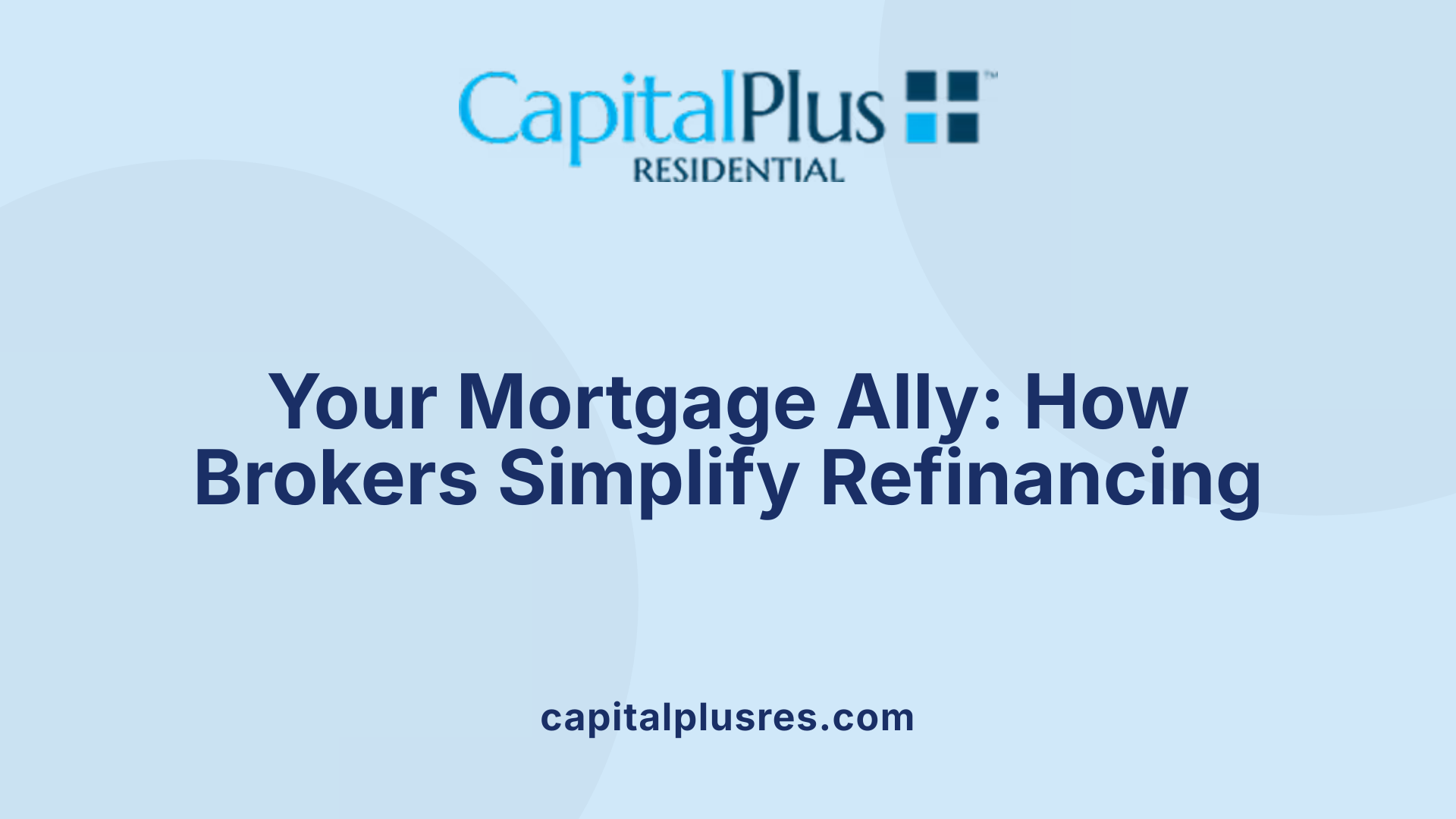Understanding the Role of Refinancing in Foreclosure Prevention
Facing the threat of foreclosure can be daunting for homeowners. Refinancing, among other options, stands out as a powerful tool to ease financial burdens and avoid losing one’s home. This article delves into how refinancing can effectively prevent foreclosure, explaining its advantages, the role of mortgage brokers, available alternative solutions, and the regulatory framework ensuring borrower protections.
How Mortgage Brokers Facilitate Refinancing and Residential Lending

What services do mortgage brokerage firms typically offer to clients seeking residential lending?
Mortgage brokerage firms assist clients by thoroughly assessing financial situations, verifying creditworthiness, and organizing necessary documents. They help identify suitable loan products by comparing a broad range of options from multiple lenders, including unconventional and non-QM loans not always accessible directly. Brokers negotiate terms, rates, and conditions to secure favorable deals and guide clients through application and approval. Acting as intermediaries, they coordinate with lenders, underwriters, and real estate professionals to ensure smooth closings, providing tailored advice especially to clients with complex financial needs.
How does the residential lending process work from application to approval?
The process starts with the borrower submitting a mortgage application along with proofs of income, debts, and assets after selecting a home and lender. The lender orders a home appraisal and title search to confirm property value and clear liens. The borrower must respond to documentation requests promptly. Underwriting evaluates creditworthiness, income, and collateral, leading to approval, denial, or pending status. Before closing, the borrower obtains homeowners insurance, reviews costs, and prepares for payments. Closing involves signing documents, transferring ownership, and finalizing the mortgage.
What are the advantages of using a mortgage broker compared to direct lending from banks?
Mortgage brokers offer access to various lenders and loan options, improving chances to find better rates and terms tailored to unique financial situations. They assist borrowers who might face challenges with banks, providing personalized advice and helping navigate complex applications. Brokers can uncover competitive rates from their relationships with wholesale lenders, increasing financial stability and reducing foreclosure risks. Their broader options and flexibility exceed what a single bank typically offers.
What are some common types of residential mortgage loans available through brokers?
Brokers offer conventional loans, government-backed loans (FHA, VA, USDA), and specialized programs. Borrowers may choose fixed-rate mortgages with stable payments or adjustable-rate mortgages featuring lower initial rates that can adjust over time. Loan lengths vary, with common terms like 15 or 30 years affecting payment size and interest costs. Other features include interest-only payments and balloon payments, which require careful assessment. Brokers help match loan types to credit score, down payment ability, and long-term goals.
How do mortgage brokers determine which loan products are best suited for a particular client?
Brokers first evaluate credit scores, income, debts, and goals. They then compare lender offerings for suitable interest rates, terms, and payment flexibility aligned with the borrower's needs. Brokers curate and present a selection of loans, assist with applications, and support through underwriting. Recommendations factor in costs and how well a loan fits the individual's circumstances, leveraging broker expertise and lender networks to find optimal mortgage solutions efficiently.
Refinancing as a Foreclosure Prevention Tool

What is refinancing and how does it benefit homeowners?
Refinancing means taking out a new mortgage to pay off an existing one. This can help homeowners by potentially lowering their monthly payments through better interest rates or longer loan terms. By adjusting the mortgage terms, refinancing provides a way to make homeownership more affordable, especially when financial situations change.
Under what conditions should homeowners consider refinancing?
Homeowners should consider refinancing if current interest rates are lower than their existing mortgage rates and if they have maintained timely payments recently. It's also important to have sufficient equity in the property and stable income to qualify for refinancing programs.
How does refinancing impact monthly payments and interest rates?
By refinancing, homeowners can often secure a loan with a lower interest rate, which directly reduces monthly mortgage payments. Additionally, refinancing can convert an adjustable-rate mortgage to a fixed-rate one, providing more payment stability. Extending the loan term can also spread out payments, lowering monthly costs.
Which refinancing programs help prevent foreclosure?
Programs like BlueHub SUN offer refinancing specifically for homeowners facing foreclosure risks. These programs typically require no credit score, no down payment, and manual underwriting to make refinancing accessible. They are designed for owner-occupied properties with stable incomes and allow loan amounts up to 75% of the property's value. Freddie Mac also offers various refinancing options to reduce payment burdens and avoid foreclosure.
How does refinancing help prevent foreclosure?
Refinancing helps prevent foreclosure by replacing an unaffordable mortgage with a new loan that has more manageable monthly payments or terms. This reduces financial strain, allowing homeowners to stay current on their mortgage and avoid default. It can be a vital option for homeowners with equity and stable income to regain control of their mortgage payments and secure their home ownership.
Alternative Strategies to Avoid Foreclosure Beyond Refinancing

What other options exist for homeowners facing foreclosure besides refinancing?
Homeowners facing foreclosure have multiple alternatives besides refinancing, designed to provide relief and prevent loss of their homes.
Loan Modification
Loan modification involves changing the terms of the existing mortgage to make payments more affordable. This can include lowering the interest rate, extending the loan term, or adding missed payments to the loan balance. It is suited for long-term financial difficulties.
Forbearance
Forbearance offers temporary relief by pausing or reducing mortgage payments for short-term hardships. This helps borrowers avoid foreclosure while they stabilize their finances.
Repayment Plans and Reinstatement
Repayment plans allow missed payments to be paid over time by adding partial amounts to regular payments. Reinstatement means paying all overdue amounts in one lump sum to stop foreclosure proceedings.
Selling Options
Selling the home outright is preferable if the home's value exceeds the mortgage balance. If not, a short sale, where the home is sold for less than owed with lender approval, can avoid foreclosure and reduce financial burden.
Deed-in-Lieu of Foreclosure and Short Sales
A deed-in-lieu involves voluntarily transferring ownership to the lender, often avoiding deficiency judgments and limiting credit damage. Short sales similarly help avoid foreclosure but still involve selling the property.
Bankruptcy and Legal Solutions
Bankruptcy can temporarily or permanently halt foreclosure depending on the chapter filed. Legal recourse such as wrongful foreclosure lawsuits and foreclosure mediation programs may also offer solutions.
Each option requires early communication with lenders, the guidance of HUD-approved housing counselors or legal advisors, and evaluation based on the homeowner's unique situation to select the best alternative to refinancing.
Recognizing and Avoiding Predatory Lending in Mortgage Refinancing

What should homeowners watch out for to avoid predatory lending when refinancing?
Homeowners considering refinancing need to be vigilant about predatory lending practices that can lead to financial distress and eventual foreclosure. Common warning signs include:
- Excessive fees that are not justified by services provided.
- Mortgage brokers receiving high compensation through fees or yield spread premiums, which may encourage costly loan terms.
- Prepayment penalties that prevent paying off loans early without substantial penalties.
- Loan flipping, where loans are refinanced repeatedly with no real benefit but added costs.
- Equity stripping by inflating fees or loan balances.
- Misstated income or other documentation to qualify for unfavorable loans.
These predatory tactics often target vulnerable homeowners and increase their risk of default.
Impact on foreclosure risk
Such lending practices usually burden borrowers with unaffordable loans, escalating missed payments and foreclosure threats. Recognizing and avoiding these red flags can reduce the chance of losing one's home.
Importance of legal review and counseling
Borrowers should have loan documents reviewed by legal professionals before signing. Consulting with HUD- or MSHDA-certified housing counseling agencies provides personalized advice and helps identify suspect loan terms or fees. Professional guidance increases borrowers' understanding and protection.
Broker fees and compensation transparency
Transparency about how mortgage brokers are paid is crucial. Understanding fees and yield spread premiums ensures borrowers are not unknowingly charged inflated costs. Always request a clear disclosure of all fees and terms from lenders and brokers.
By watching for these red flags, seeking professional advice, and demanding transparency, homeowners can protect themselves from predatory lending when refinancing.
Navigating Foreclosure Proceedings and Legal Protections While Considering Refinancing

What is the foreclosure process and what happens at a Sheriff’s Sale?
Foreclosure is a legal process where a lender seeks to recover the balance owed on a defaulted loan by selling the property used as collateral. In Michigan, most foreclosures occur through a non-judicial process called a Sheriff’s Sale, where the property is auctioned publicly. This sale is advertised in advance, giving homeowners notice.
How does the redemption period work after a Sheriff’s Sale?
After a Sheriff’s Sale, homeowners typically have a redemption period, often around six months, to reclaim their home. To redeem, they must pay the sale price plus any fees and interest. This period offers a final opportunity to avoid losing ownership and regain the home.
What legal options do homeowners have to stop foreclosure?
Homeowners facing foreclosure can explore several legal protections and options:
- Mortgage Reinstatement: Paying all overdue amounts, including fees and interest, prior to the sale stops foreclosure.
- Loan Modification: Amending loan terms like extending repayment or lowering interest to make payments affordable.
- Repayment Plans: Gradually catching up on missed payments through temporary increased installments.
- Refinancing: Replacing the old mortgage with a new loan that offers better rates or terms, easing monthly payments.
- Forbearance Agreements: Temporarily pausing or reducing payments during hardship.
- Deed-in-Lieu of Foreclosure and Short Sales: Voluntary surrender or approved sales that minimize credit damage.
- Bankruptcy: Filing Chapter 7 or 13 can temporarily or permanently halt foreclosure.
- Wrongful Foreclosure Lawsuits and Moratoriums: For disputing illegal foreclosures or temporarily suspending proceedings.
What role do counseling and legal assistance play?
Certified housing counselors from HUD or MSHDA offer free guidance to homeowners navigating foreclosure. They help explore options, negotiate with lenders, and avoid scams. Legal counsel is crucial for understanding complex rights, filing lawsuits, and ensuring proper procedures are followed.
How do government programs support refinancing and foreclosure prevention?
Programs like U.S. Treasury’s Hardest Hit Funds and initiatives from Freddie Mac provide mortgage payment assistance, loan modifications, and refinancing options. These programs are designed for eligible homeowners to reduce payments, avoid foreclosure, and stabilize their housing situation.
How does refinancing fit into foreclosure prevention?
Refinancing is a vital tool that allows homeowners to replace an existing mortgage with one offering lower interest rates or better terms. This can reduce monthly payments and improve financial stability, helping avoid foreclosure. Combined with legal options and counseling, refinancing empowers homeowners to keep their homes and regain control over their mortgages.
Embracing Refinancing as Part of a Holistic Foreclosure Prevention Strategy
Refinancing emerges as a vital tool for homeowners seeking to avert foreclosure by providing options to lower monthly payments and stabilize mortgage terms. However, it must be considered alongside other alternatives such as loan modifications, forbearance, and legal remedies to effectively address diverse financial challenges. Engaging mortgage brokers offers borrowers access to a broad array of financing choices fitted to their needs, while vigilance against predatory lending safeguards financial health. By acting promptly, maintaining communication with lenders, and utilizing expert counseling services, homeowners can navigate foreclosure threats with greater confidence and preserve homeownership.
References
- Avoid foreclosure - coronavirus mortgage relief options
- Michigan Lending & Foreclosure Guid ee
- Foreclosure and Eviction for Homeowners
- How to Refinance Out of Foreclosure
- Understanding options to stay in your home
- Home Loan Modification
- How To Legally Stop a Foreclosure
- Mortgage Broker vs Bank | Pros and Cons









